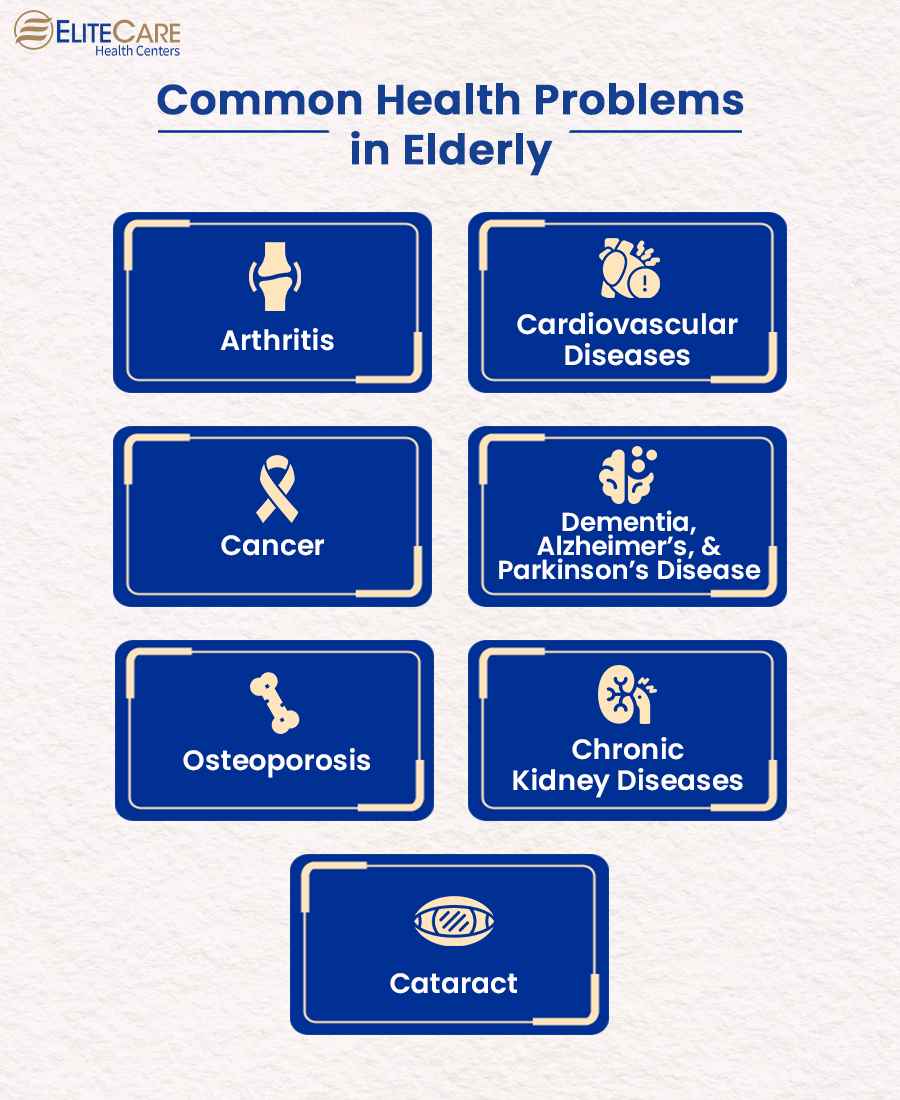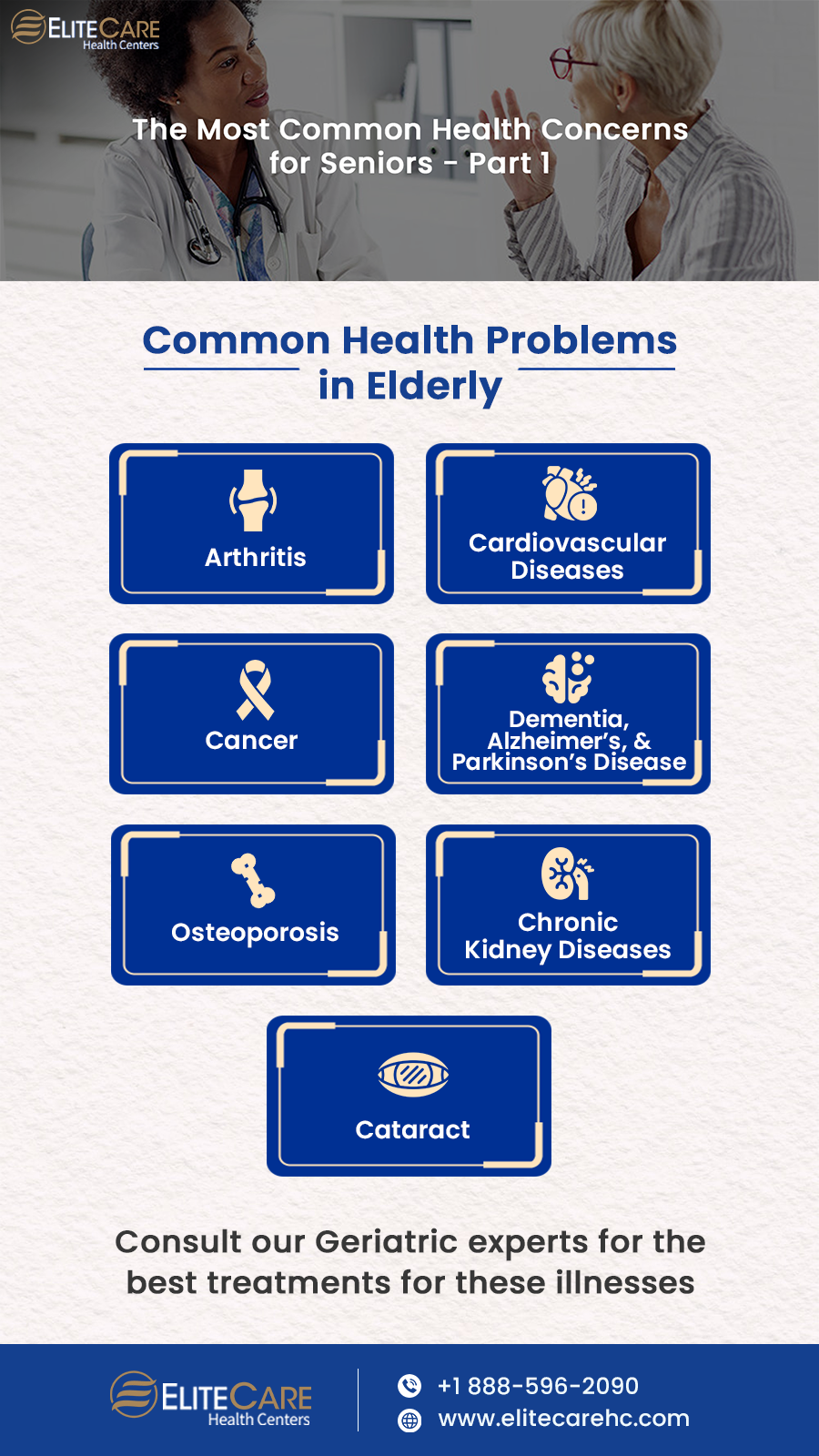
Geriatric population in the US is growing rapidly. By 2050*, the number of people over 85 will triple. As older adults are more likely to develop chronic health conditions, it is important that families and the health care system work together to ensure their optimum quality of life as their loved ones age.
Common age-related changes that occur in the body usually result in a weakened immune system, high blood pressure, and loss of vision and hearing. A person’s health, genetics, and lifestyle will also play a crucial role in determining their health, especially in their old age.
The following are some of the most common health problems in the elderly age group. Some additional and common medical challenges are covered in the second edition of this blog post

1. Arthritis
Arthritis is among the most common illnesses affecting older persons. Its symptoms include joint discomfort and chronic inflammation in the joints. There are two types of arthritis – rheumatoid arthritis and osteoarthritis. Osteoarthritis is the more common form of arthritis, caused by gradual deterioration of the cartilage that cushions bones in joints. Rheumatoid arthritis is an autoimmune condition, wherein the body’s own immune system attacks healthy tissue. Prevention of arthritis is largely dependent on diet, exercise, and quitting smoking in case of smokers.
An essential part of managing chronic arthritis is movement. Lack of movement leads to weak muscles and stiff joints. Consult with a certified specialist to understand the optimum amount of movement needed and create a pain management strategy for arthritis.
2. Cardiovascular Diseases
The most common condition in this category of diseases is chronic bronchitis. Bronchitis is caused by an infection in the lungs and airways that leads to a buildup of excessive mucus. Through coughing, the body strives to remove this accumulation. Severe coughing causes more than just irritation. It can disrupt sleep and wear out the body. Chronic coughing can also cause vomiting, dizziness, and even rib fractures.
Bronchitis can lead to pneumonia if not treated in time. The elderly are more prone to developing pneumonia. Respiratory failure is the primary cause of mortality in this case.
3. Cancer
With a few exceptions, age is the biggest risk factor for the majority of cancers. The median patient age at the time of a cancer diagnosis is 66, according to the National Cancer Institute (NCI). 60 percent of cancer patients are 65 years of age or older.
While cancer can affect anyone at any age, most types of cancer become more common with age. This is because the body’s cells get damaged and more vulnerable over time. As one becomes older, cell damage can worsen and eventually result in cancer. Some of the most common cancers amongst the elderly include breast cancer, prostate cancer, lung cancer, bladder cancer, and colon cancer.
The sure shot way to stay protected from cancer is to maintain a healthy lifestyle and go in for regular cancer screenings. Early detection has the highest chance of recovery.
4. Dementia, Alzheimer’s, and Parkinson’s Disease
The term dementia is used to define a syndrome or group of chronic illnesses that affect elderly people’s memory and cognition. This occurs when there is damage to brain cells or a loss of connection between cells that causes them to degenerate and die.
According to the Alzheimer’s Association, 6.5 million Americans aged 65+ and older are living with the disease currently. Alzheimer’s occurs due to the disruptive buildup of proteins in the brain.
Another form of dementia is Parkinson’s disease. The loss of nerve cells in the brain, which lowers the quantity of dopamine required for normal cognitive function, leads to this degenerative disease.
These conditions require proper medical attention in order to be managed.
5. Osteoporosis
Osteoporosis is caused by a prolonged deficiency of calcium in the body. Low calcium consumption increases the risk of fractures, early bone loss, and decreased bone density. This illness generally stays undiagnosed until a fall results in a break or a fracture and the problem gets diagnosed.
Losing bone strength is a natural part of aging, much like losing muscle mass, but patients with osteoporosis notice this drop more quickly than the average person. Medication and dietary supplements like calcium and vitamin D can be used to treat osteoporosis. Exercises that involve lifting weights, balance exercises, and those intended to build muscle strength under proper supervision can also enable older people to manage this problem.
6. Chronic Kidney Diseases
Chronic kidney disease can be triggered by kidney infections, kidney inflammation, excessive blood pressure, diabetes, or reaction to antibiotics. When left untreated, kidney problems can lead to kidney failure. Usually, this illness is only discovered through urine tests ordered for other medical reasons. To keep your kidneys healthy, get kidney function tests and preventative health checks done regularly.
7. Cataract
According to researchers, over 24.4 million Americans, or approximately one in every six persons in this age group (age 40 and older), have cataracts. Additionally, half of all Americans have cataracts by the age of 80. Women are slightly more likely than men to develop cataracts.
Most cataracts are caused by the natural changes that occur in your eyes as you age. Your eye’s lens is clear while you’re young. The proteins in your eye’s lens begin to deteriorate and clump together around the age of 40. This mass creates a cataract, which is a clouded spot on your lens affecting the quality of vision.
It is not scientifically proven that cataracts can be completely prevented, but they are inevitable as we age. A cataract can only be removed surgically, though you may not need to have surgery straight away. If diagnosed early on, cataracts may be manageable. Get in touch with your provider for the course of treatment.
We shall continue this list of common health problems in the elderly in part 2 of this topic.
Key Takeaway
The challenges of aging health can be reduced by adopting healthy lifestyle choices. Here is the list of lifestyle changes seniors can adopt in order to age in a healthy fashion.
Having a medical team that includes geriatric experts involved in your care can make it easier for you to prevent or manage your chronic illnesses. If you are looking for the best primary doctors in Florida, contact EliteCare HC, one of the leading medical clinics in America. We have some of the best geriatric primary care physicians of Florida working on our team. Get personalized senior care services from trained professionals.
*Jaul, E., & Barron, J. (2017). Age-Related Diseases and clinical and public health implications for the 85 years old and overpopulation. Frontiers in Public Health, 5.






